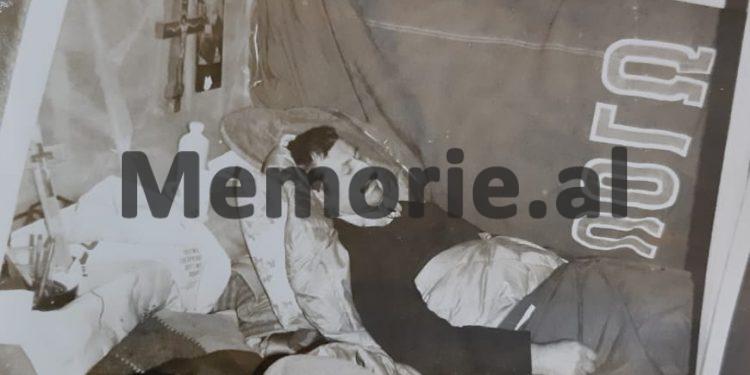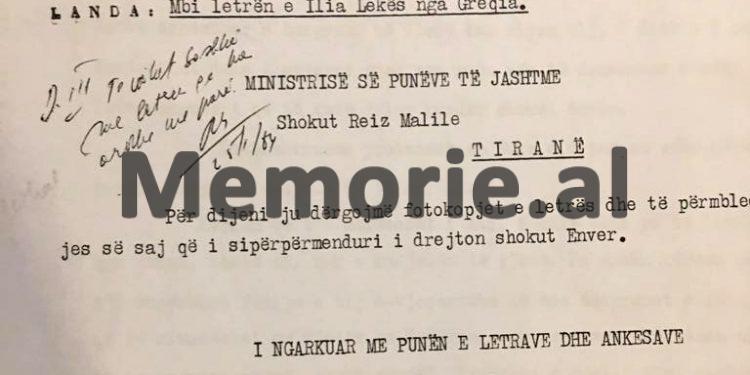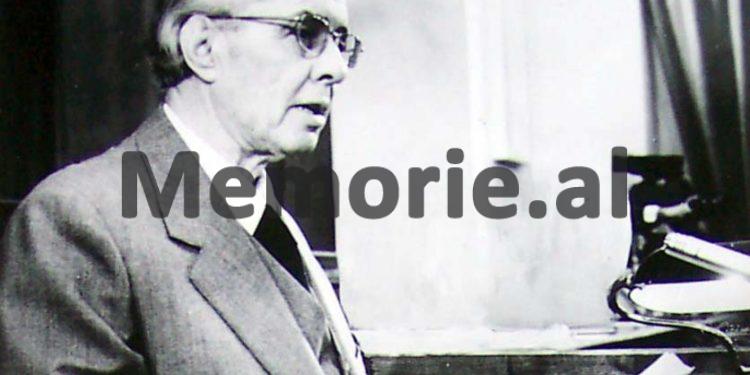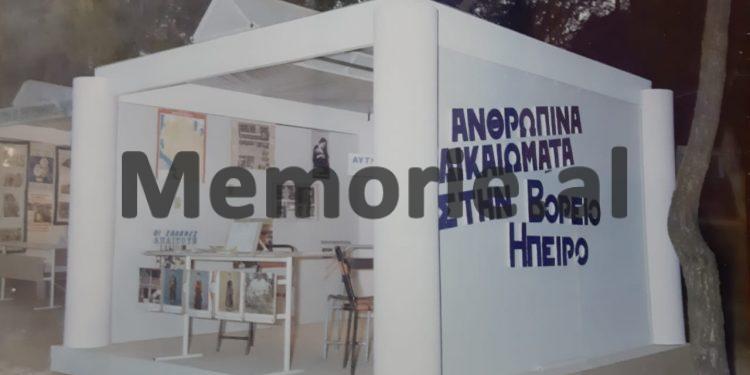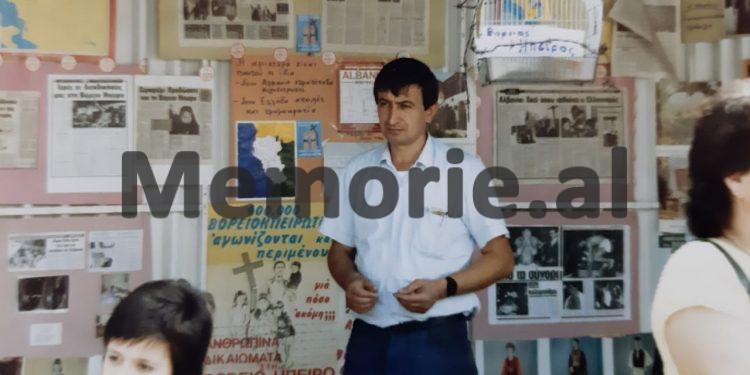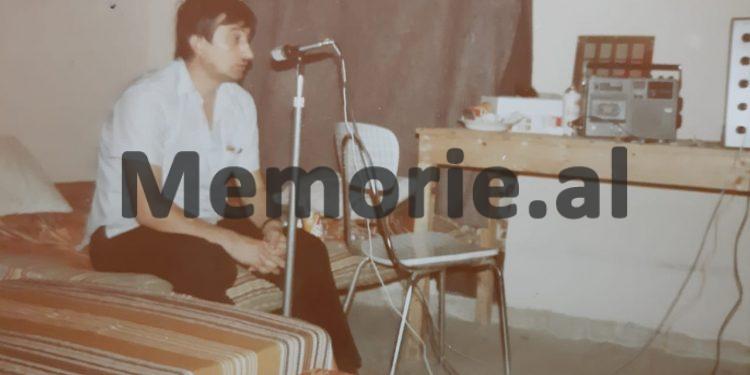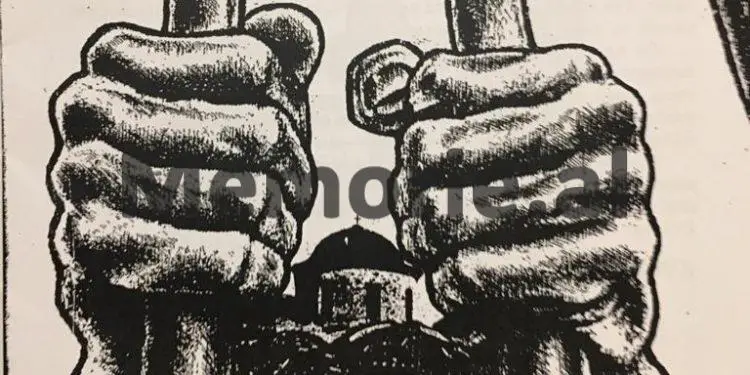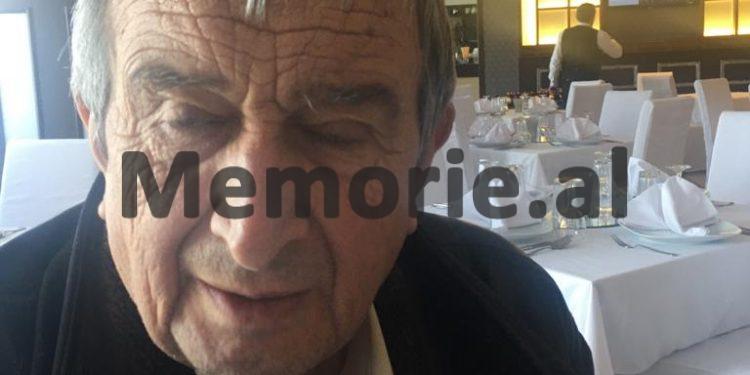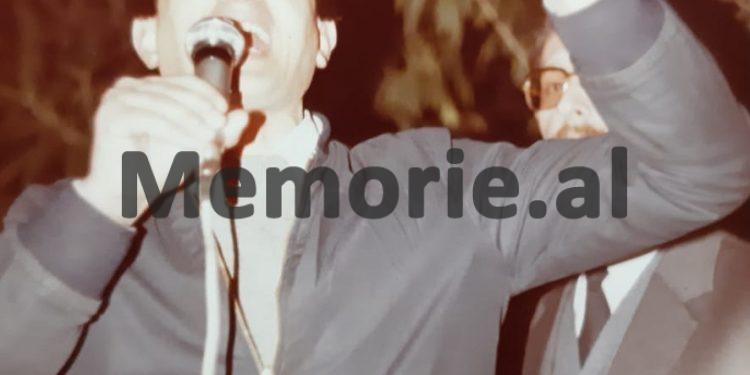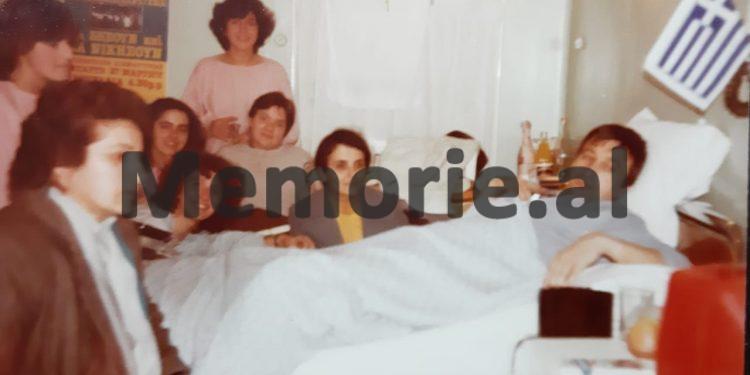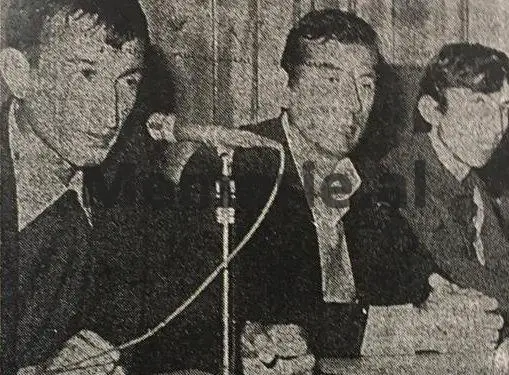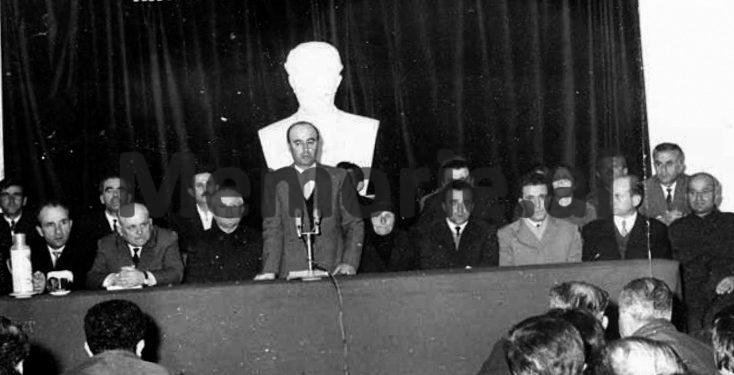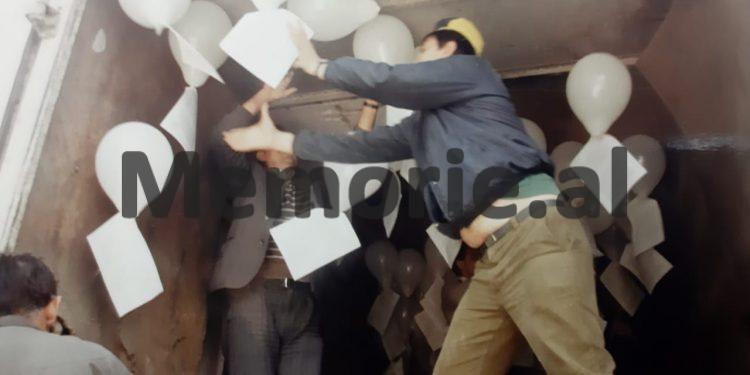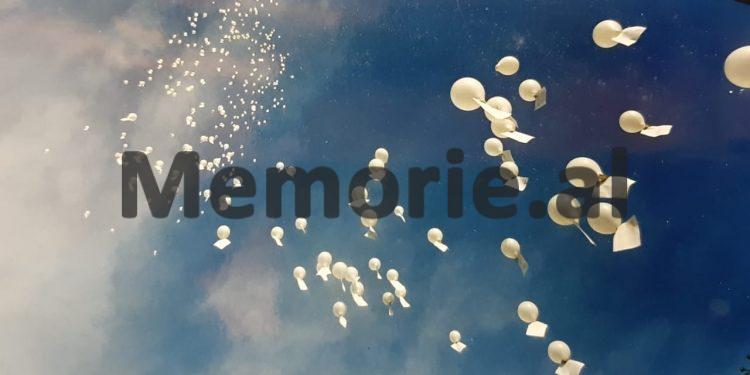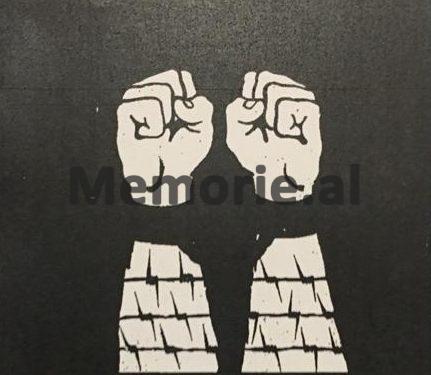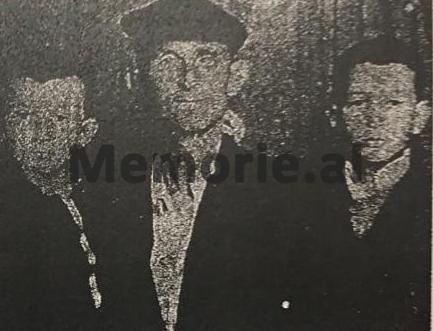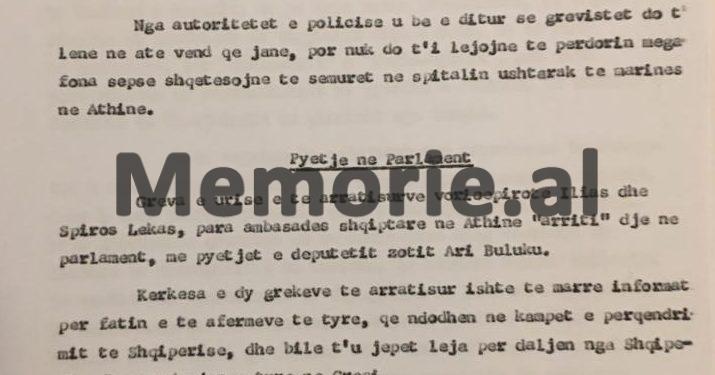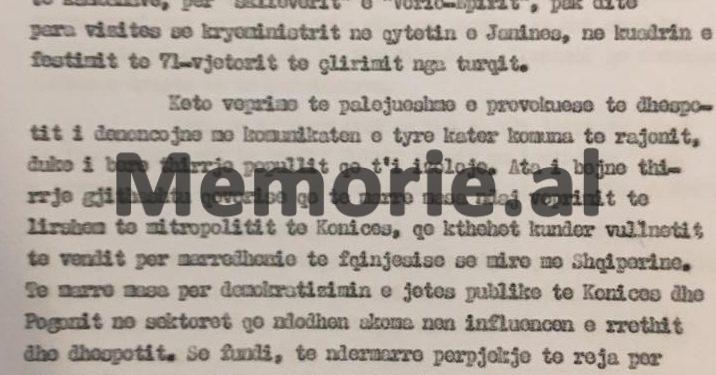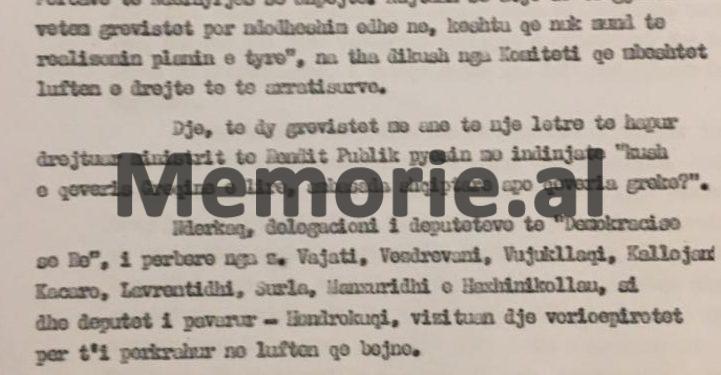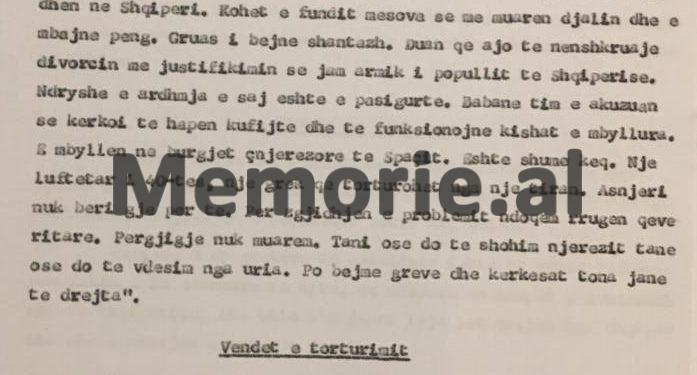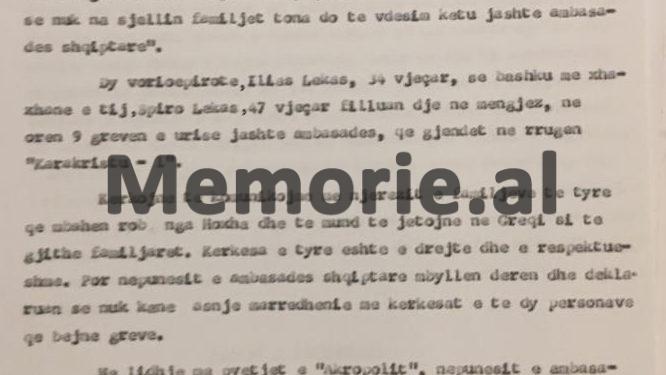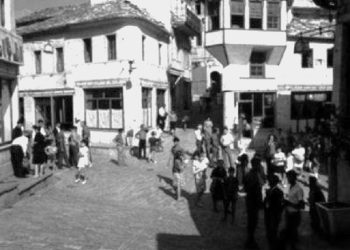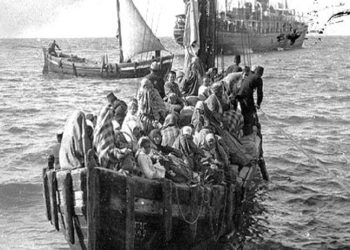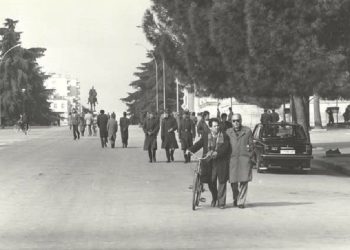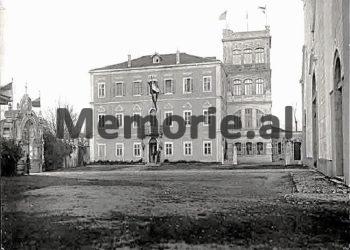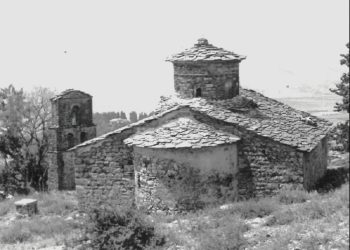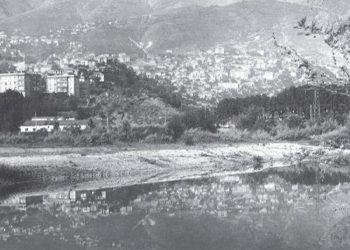Dashnor Kaloçi
Second part
Memorie.al publishes some archival documents extracted from the Archive of the Ministry of Foreign Affairs in Tirana and the Authority for Information of the Files of the former State Security, which are part of a voluminous file which deals with the rare and unknown history of Ilia Lekës, originally from the village of Glinë in the Greek minority of Gjirokastra, whose family had been living in exile in the villages of Myzeqe since 1945, and whose father, Theodhoriu, had been arrested since 1951 and was serving time in camps and prisons. accused of being an “agent of Greek Intelligence”.
The efforts of the State Security to recruit Ilian and then to arrest him, and Ilia escaped together with his brother Kriston and their uncle to Greece, where after some threatening letters that Ilia wrote to Enver Hoxha, Ramiz Alia and Adil Çarçan, where he was asked to get his father out of prison and, with his wife and two children, allowed to come to Greece, the three went on a hunger strike in front of the Albanian embassy in Athens, which lasted until 1984.
The strike, which caused major diplomatic problems in official relations between the two countries, raised awareness not only of the Greek parliament and the government of Athens, but also of the Greek press and some ultra-nationalist parties and chauvinist circles in the north, led by Metropolitan Sevastianos. who used it for their own interests, as well as Ilia Leka’s speeches in the European Parliament and the American Congress, for the violation of human rights in the communist regime in Albania, until they forced Enver Hoxha to come out publicly and declare: “I I say responsibly to the Greek brotherly people that there are only 46 citizens from the Greek minority in Albanian prisons and only 4 of them for political crimes “, as well as Ramiz Alia to release Theodhori Leka from prison in 1989, allowing him to go to Greece forever .
“I was waiting for prison without knowing anything. And we were forced to leave to escape prisons and torture. So much for knowledge. Now, as I wrote to you there, I say to you: To allow my family. Do not hold my 4-year-old son captive, do not keep my father in prison 63 years old by torturing him, do not make me tell you, to commit inhuman acts. My father will die, I know, even if you get him out of jail, he does not live more than 6 months. But know you and your Government, the death of my father at the moment I find out, let it be even day at lunch, then you will be convinced what I will do, but you will say that clearly made me on paper. I have told you and I will tell you like men openly. Handing over my family to me washes the accounts. “Then let the Greek government deal diplomatically, because my father has been in prison and internment since 1951. He did not see a white day.”
This is stated, among other things, in a letter sent personally to Enver Hoxha, dated December 25, 1983, authored by an Albanian citizen named Ilia Theodhori Leka, originally from the village of Glinë in Gjirokastra and residing in Kolonjë. of Lushnja, where he had lived with his family in exile from 1945 until April 12, 1982, when together with his brother, Kristo Leka and their uncle, they were forced to flee Albania to Greece.
The letter in question to Enver Hoxha, which is handwritten by the minority Ilia Leka, is an official document and part of a very voluminous file with the initials “Top secret” issued by the Archive of the Ministry of Foreign Affairs of Albania and The Authority for Information of the Former State Security Files, which reflects in hundreds of typed or handwritten sheets, the whole story of Ilia Leka and his family.
Starting from the origin of the family from the village of Glinë of the Greek minority in the district of Gjirokastra, where in 1945 two sons of the Leka family escaped, their internment in 1951, in the village of Savër in Lushnja and then in some villages of of that area of Myzeqe, the State Security surveillance of Ilia Leka’s father, Theodhori, who was a shepherd in the hills around the Ardenica Monastery, the reports of State Security collaborators given to Security operatives who followed and monitored Theodhori Lekën, their relations with the top chiefs, the combinations and legends that were made to “dismantle his agency activity”, the arrest of Theodhori in 1951, accused as an agent of the Greek Intelligence and liaison with several persons and agents who fleeing from Albania to Greece and vice versa ”, serving his sentence in several Albanian prison camps, the State Security attempt since the 1970s to recruit his son, Ilia Lekë, his rejection and various provocations of the Security collaborators and the people introduced by him, Ilia’s vicissitudes with letters of complaint in the high state and party instances or meetings with the heads of the courts and the prosecution, demanding the release of his father from prison as innocent, the arrest of Ilia’s uncle and the torture against him in the Vlora Internal Branch, where he was forced to sign a statement about Ilian, as if he had spoken against ” Ilia’s escape with his brother Kriston and their uncle on April 12, 1982, leaving for Greece through the border villages of their homeland, the threatening letters that Ilia sent from Greece to Enver Hoxha, Ramiz Alia , Hekuran Isa, Adil Çarçani and Reiz Maliles, where he asked them to release his father from prison and not to torture him anymore, not to hold his 4-year-old son hostage and not to put pressure on his wife his that to force him to divorce Ilian and remarry another, but to allow them to come to Greece, Ilia Leka’s hunger strike with his brother and uncle in front of the Albanian embassy in Athens that lasted about three years raising public awareness and the Greek policy that made it the issue of the day of the Greek Parliament and the government of Athens, the commitment of the Athens police to protect the Albanian embassy from the fear of Ilia Leka who had set up a tent in front of its main entrance, secret daily correspondence with urgent telegrams of the Albanian Ambassador in Athens, Xenophon Nushi, with the Foreign Ministry in Tirana and personally, Enver Hoxha, Ramiz Alia, Adil Çarçani, Hekuran Isain and Reiz Malilen, keeping an eye on everything that happened there with the hunger strikers and politicians of the Greek deputies who showed solidarity with the strikers and participated in the protest rallies that took place in front of the Albanian embassy, the articles of the main newspapers gr eke that regularly followed that event, as well as the reaction of some nationalist parties and Metropolitan Sevastiano who asked the Greek government to resolve the issue as soon as possible and “the fate of 400 thousand Greek minorities suffering under Hoxha’s regime”, correspondence between the Ministry of Foreign Affairs Foreign Affairs of Albania and Greece regarding the problem of the strike of Ilia Lekë, etc., etc.
Along with all these that, as we said a little above, are part of a voluminous file which is available in full at Memorie.al and I will make it public starting from this writing, in the coming days we will also meet with an interview long exclusive of Ilia Leka who lives with his family in Athens, where he testifies about these events that contain these archival documents and others that are not reflected there. Since the hunger strike in front of the Albanian embassy in Athens, which shook the official relations between Albania and Greece and forced Enver Hoxha to come out publicly and declare: “I say responsibly to the Greek brother people, that there are only 46 citizens in Albanian prisons Albanians who are part of the Greek minority and only 4 of them are for political faults “, the awareness of the Greek press made the strike of Ilia Leka, who was invited and spoke at the European Parliament in Brussels and at the American Congress in Washington for the violation of human rights from the dictatorial communist regime of Enver Hoxha, until the “overthrow” of official Tirana in 1989, which was forced to release Ilia’s father, Theodhori, from prison and allow him to go to Greece to his son, where he lived for many years after the overthrow of the communist regime, rejoicing in the arrival of the rest of the family that had remained in Albania.
Continued from the previous issue
“Top secret” telegrams of the Albanian ambassador in Athens, Xenophon Nushi, sent to the Foreign Ministry in Tirana, for Enver Hoxha, Ramiz Alia, Adil Çarçni and Hekuran Isain
VERY SECRET DECLARATION
Nr. 315 From Athens
MINISTRY OF FOREIGN AFFAIRS
The fugitives continue to stand in front of the embassy. It has been half an hour since they started repeating in a megaphone the usual insults against our government, for the persecution of 400 thousand northern Epiriots, etc., and they demand that Ilia Leka’s family be allowed to come to Greece. Residents around the embassy demanded to rest and police forced them to stop using the megaphone. From what we see, they will spend the night in front of the embassy. We have taken vigilance measures and the work continues normally.
Cenon
……………………………………………………………………………………………………………………………………
Greek press articles about Ilia Leka, Albania and the strike of three minorities of the Leka family, in front of the Albanian embassy in Athens
Greek press
The newspaper “Akropolis” dated February 7, 1984, publishes the article entitled “Hunger strike outside the Albanian embassy began the northern-Epiriot fugitives, bring our people from the hell of Hoxha. The government did not help us “, wrote by Peris Halaxias. It says:
“We are Greeks, fleeing from Albania. We came to our homeland to fight. What are we looking for? What every parent wants. To see our women and children, who are captives in Hoxha’s country. “If our families do not bring us, we will die here outside the Albanian embassy.”
Two northern Epirotes, Ilias Lekas, 34 years old, together with his uncle, Spiro Lekas, 47 years old, started yesterday morning at 9 o’clock, the hunger strike outside the embassy, located on the street “Karakristu – 1”.
We ask to communicate with the people of their families who are held captive by Hoxha and can live in Greece like all family members. Their request is fair and respectable. But Albanian embassy officials closed the door and said they had nothing to do with the demands of the two strikers.
Regarding the questions of “Acropolis”, the employees of the Albanian embassy emphasized that they have no relationship with what is happening outside their building.
CALAMITY
Meanwhile, Ilias Lekas and his uncle, Spiro Lekas, built a tent on the sidewalk of the Athens Navy Hospital, placed large slogans and pictures of their relatives being tortured in Albania. They stated:
“If we do not see our wives and children, we will not leave here. “We are determined to die.”
Ilias Lekas, 34, tells “Acropolis” about his problem.
“I escaped with my uncle from the prisons of Albania on April 12, 1982. We came to Greece because we are Greeks. Our fight is just. I want to see Marine, my wife and my son Anestin, who has just turned 5 years old. I send letters, but some “lose” others return with the excuse that these people are not in Albania. I recently learned that my son was taken and held hostage. The woman is being blackmailed. They want her to sign the divorce with the excuse that I am an enemy of the people of Albania. Otherwise its future is uncertain. My father was accused of asking for the borders to be opened and closed churches to function. He was imprisoned in the inhuman prisons of Spaç. It’s very bad. A fighter of the ’40s, a Greek who is tortured by a tyrant. No one did anything for him. To solve the problem, we followed the government path. We did not receive an answer. Now we will either see our people here, or we will starve to death. “We are on strike and our demands are right.”
Places of torture
Next to Ilias stands his uncle, Spiros Lekas, who has cast his gaze in front of the embassy, but no one misses the hunger strike he is doing. Spiros Lekas has a wife, Ekaterini, 42, and three children, Vasiliq, 20, Thomana, 18, and Vangjeli, 16. We asked him to tell us something about his life:
“I have gone through terrible tortures,” Spiros Leka began to tell, “to the hell that Hoxha calls paradise, I spent a life full of humiliation and contempt.” I remember that day when a Security car stopped and a man inside said to me:
-In the name of the people you are arrested for political charges. But I had not insulted anyone. However, I was arrested. They tied my hands and hit me. I was covered in blood. After a few days the wood cracked, I was forced to sign all the accusations against me. I escaped from prisons. “Now I am in my homeland and I will continue the war and either my people will come or I will die.”
Police authorities became known that strikers would leave them in that country, but they would not be allowed to use megaphones because they disturb the sick at the Navy Military Hospital in Athens.
Questions in Parliament
The hunger strike of the North Epirus fugitives, Ilias and Spiros Lekas, in front of the Albanian embassy in Athens “arrived” yesterday in the Parliament, with the questions of the deputy, Mr. Aris Buluku. The request of the two Greek fugitives was to get information about the fate of their relatives, who are in the concentration camps of Albania, and even to be given permission to leave Albania and settle in Greece.
The note of the article is accompanied by this caption:
- Ilias Lekas, along with other northern Epiriots who are supporting the hunger strike, while talking to the director of the second zone police, Mr. Vasilis Curapa.
- Only pictures remained of their beloved faces.
Do they live? And if they live until when?
Greek press
The newspaper “Rizospastis“, dated February 16, 1984, publishes the article entitled “Sevastian organizes black day and night for the” slaves “nën and under the headline:” Provocation on the eve of Papandreou’s visit to Ioannina “.
It says:
Ioannina – The reactionary forces in the border villages of Konica and Pogon, led by Mr. Sevastianos, are organizing a three-day mourning day and night, with the ringing of bells, for the “slaves” of “North Epirus”, a few days before the visit of the Greek Prime Minister in the city of Ioannina, in the context of the celebration of the 71st anniversary of the liberation from the Turks.
These illegal and provocative actions of the Despot denounce with their communiqué four municipalities of the region, calling on the people to isolate them. They also call on the government to act against the free action of the Metropolitan of Konica, who turns against the country’s will for good neighborly relations with Albania. Take measures to democratize the public life of Konica and Pogon in sectors still under the influence of the Despot district. Finally, new efforts should be made to further develop cultural and trade relations with Albania. ”
The newspaper “Vradini” dated February 12, 1984, publishes the article entitled: “Northern Epiriots, unafraid continue”, with the subtitles: “While the government tried with tricks to remove them, to please the Albanians”, “Even “Siantos had admitted that Albanians slaughter women”, wrote by Th. Dhrakiqis.
It says:
“In the middle of the cold and facing the official Greek state, which wants to relocate them, in order not to make Hoxha, Ilias and Spiro Lekas unhappy, they are continuing today, for the eleventh day, the hunger strike, outside the Albanian embassy.
Yesterday, the two strikers, through an open letter addressed to the Minister of Public Order, ask with indignation “who rules free Greece, the Albanian embassy or the Greek government” ?!
Meanwhile, the delegation of deputies of “New Democracy”, consisting of Mr. Vajati, Vezdrevoni, Vujukllaqi, as well as the independent MP, Hondrokuqi, visited the northern Epirotes yesterday to support them in their fight.
Messages of support come from all over Greece
People who have signed or anonymous, who believe in respect for human rights, have signed the book that was opened at the strike site.
Also, many telegrams come every day to the northern-Pyrrhic syllables. Among these telegrams are those of the Democratic Movement of Secondary Education Teachers of ONENED in Ioannina, schools, syllogisms, organizations, etc.
The Metropolitan of Konica, Sevastiano, sent his two representatives to Athens, while declaring three days of mourning and vigil, on the occasion of the 70th anniversary of the autonomy of North Epirus.
The North Epirus War Students’ Coordinating Union, through its resolution, urges the Greek government to find a solution to the strike problem and calls on the people of Athens to, next Wednesday, February 22nd. At 4:30 pm, to be at the protest rally in Propiles. Meanwhile, the provocation of the Albanians of the embassy continues, and every day they observe the movements of the strikers and those who gather, photographing them from the half-closed windows.
A police bus is always parked outside the embassy and protects Ambassador K. Nushi and officials. So far, the Greek state has not expressed an opinion, but the facts show that it is completely contrary to the attitude of the strikers in front of the embassy. The Liberal Party, through its communiqué, characterizes the attitude of the government towards the two strikers, inhuman and nationally angry, while at the same time denouncing to the Greek people the act of the PASOK government. At the insistence of all these, the strikers declare “only the dead will remove us from here. We want nothing but our families. Where is our unjust action?
In the same newspaper pages, the article continues: “The Government should encourage it”, “The North Epirus problem remains, even today, open by the UN and awaits its solution in favor of Greece. Consequently, there is a national need for the PASOK government, albeit belatedly, to start the procedure for moving the northern Epirus issue back. The silence they hold is a crime. Our indifference is a crime.
These were emphasized in his statement by the Secretary General of ESKE, Mr. Al. Zografos, on the occasion of the hunger strike of the two northern Epiriots who fled outside the Albanian embassy in Athens. Mr. Zografi reminds them of some irrefutable facts of justice that prove the Hellenization of Northern Epirus, which are: /Memorie.al




